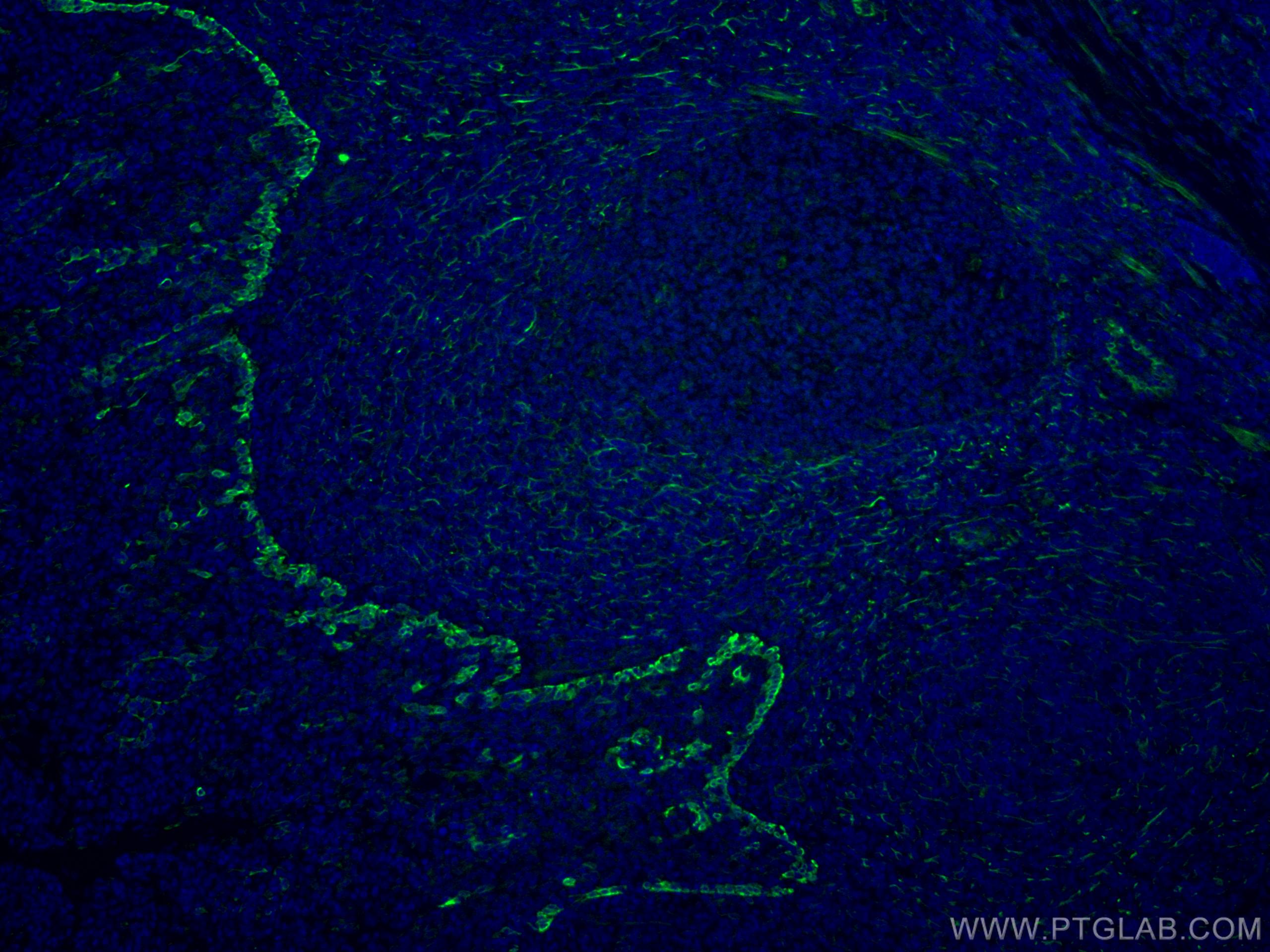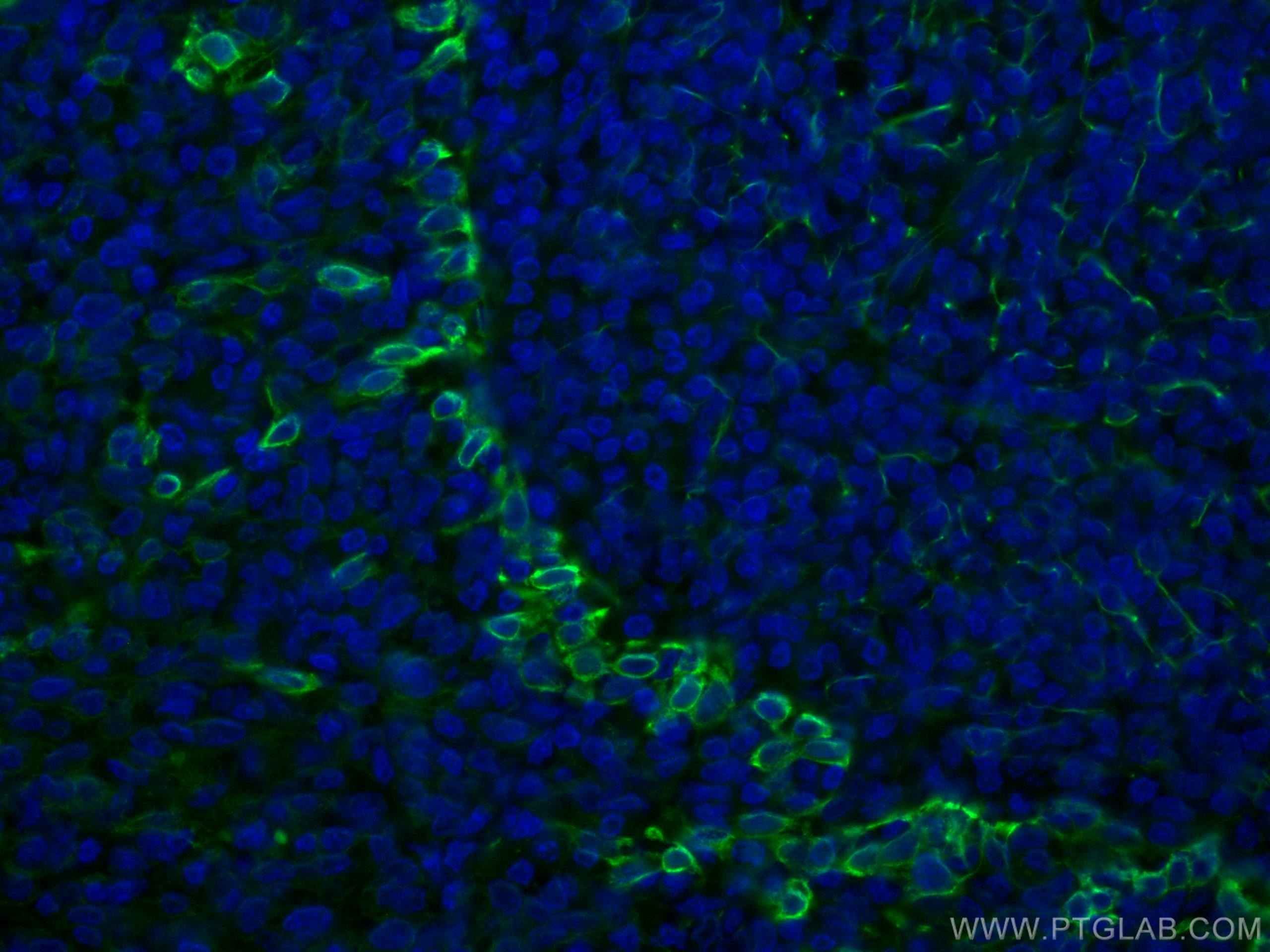验证数据展示
经过测试的应用
| Positive IF-P detected in | human tonsillitis tissue |
推荐稀释比
| 应用 | 推荐稀释比 |
|---|---|
| Immunofluorescence (IF)-P | IF-P : 1:50-1:500 |
| It is recommended that this reagent should be titrated in each testing system to obtain optimal results. | |
| Sample-dependent, Check data in validation data gallery. | |
产品信息
CL488-67317 targets TLR8 in IF-P applications and shows reactivity with Human samples.
| 经测试应用 | IF-P Application Description |
| 经测试反应性 | Human |
| 免疫原 |
CatNo: Ag16566 Product name: Recombinant human TLR8 protein Source: e coli.-derived, PET28a Tag: 6*His Domain: 261-610 aa of BC101075 Sequence: FNAPFPCVPCDGGASINIDRFAFQNLTQLRYLNLSSTSLRKINAAWFKNMPHLKVLDLEFNYLVGEIASGAFLTMLPRLEILDLSFNYIKGSYPQHINISRNFSKLLSLRALHLRGYVFQELREDDFQPLMQLPNLSTINLGINFIKQIDFKLFQNFSNLEIIYLSENRISPLVKDTRQSYANSSSFQRHIRKRRSTDFEFDPHSNFYHFTRPLIKPQCAAYGKALDLSLNSIFFIGPNQFENLPDIACLNLSANSNAQVLSGTEFSAIPHVKYLDLTNNRLDFDNASALTELSDLEVLDLSYNSHYFRIAGVTHHLEFIQNFTNLKVLNLSHNNIYTLTDKYNLESKSL 种属同源性预测 |
| 宿主/亚型 | Mouse / IgG1 |
| 抗体类别 | Monoclonal |
| 产品类型 | Antibody |
| 全称 | toll-like receptor 8 |
| 别名 | CD288, TLR8, toll like receptor 8 |
| 计算分子量 | 1041 aa, 120 kDa |
| 观测分子量 | 120 kDa |
| GenBank蛋白编号 | BC101075 |
| 基因名称 | TLR8 |
| Gene ID (NCBI) | 51311 |
| RRID | AB_2919451 |
| 偶联类型 | CoraLite® Plus 488 Fluorescent Dye |
| 最大激发/发射波长 | 493 nm / 522 nm |
| 激发激光 | Blue laser (488 nm) |
| 形式 | Liquid |
| 纯化方式 | Protein G purification |
| UNIPROT ID | Q9NR97 |
| 储存缓冲液 | PBS with 50% glycerol, 0.05% Proclin300, 0.5% BSA, pH 7.3. |
| 储存条件 | Store at -20°C. Avoid exposure to light. Stable for one year after shipment. Aliquoting is unnecessary for -20oC storage. |
背景介绍
Toll-like receptors (TLRs) are a group of pathogen recognition receptors (PRRs) that can be divided into two subfamilies depending on their subcellular localization(PMID: 32268138). Toll-like receptor 8 (TLR8), a sensor for pathogen-derived single-stranded RNA (ssRNA), binds to uridine (Uri) and ssRNA to induce defense responses (PMID:30535046). TLR8 proteins were expressed in spleen, epididymal sperm, testicular sperm cells, and Leydig cells but were weak in Sertoli cells. It can identify two isoforms,120 and 122 kDa.
实验方案
| Product Specific Protocols | |
|---|---|
| IF protocol for CL Plus 488 TLR8 antibody CL488-67317 | Download protocol |
| Standard Protocols | |
|---|---|
| Click here to view our Standard Protocols |



